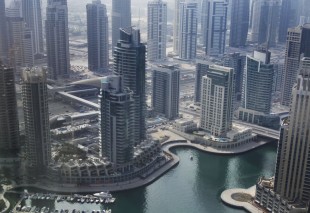

Dubai and Jeddah hotels report strong performance

Occupancy at four- and five-star hotels in Dubai hit 87% in February according to the latest HotStats data from TRI Hospitality Consulting.
The strong demand allowed hoteliers to increase yields with the market witnessing an 8.7% surge in average room rates to US $366.99, resulting in revenue per available room rising 7.3% to US $321.59.
The increase in demand also contributed to a 4% and 3.8% rise in food and beverage revenues, while TrevPAR grew 5.8% to $554.93.
Tri Hospitality Consulting managing director Peter Goddard said: “Strong economic activity within the city coupled with a consistent rise in visitor numbers has driven demand for Dubai’s hotels, especially food and beverage demand with revenues increasing over 4% from the same period in 2013. The uplift in overall revenues directly impacted bottom line performance which reached $282.09 per available room.”
In the UAE capital, hotels struggled to remain afloat, with average rates falling throughout the month. While occupancy was up 3.3 percentage points to 80.2% at Abu Dhabi hotels, ARR plummeted 18.1% to $162.46, reducing RevPAR by 14.6% to $130.36.
A sharp decrease in F&B revenues, the decline in conference and banqueting revenues, and a 2.5 percentage point rise in payroll costs resulted in profitability falling to $90.83.
“Although hotels in Abu Dhabi continued to report strong occupancies, the market experienced an 18.1% decline in average rates compared to the same month last year. This was largely due to the exceptional performance witnessed during February 2013 when Abu Dhabi hosted IDEX, a biennial mega-event which allowed hotels to command significantly higher average rates. This year, the lower average rates significantly impacted room revenues that were further suppressed by increased rooms expenses and payroll costs,” explained Goddard.
Low performance by Kuwait hotels was attributed to outbound travel during the national holiday, which caused occupancy to slump 10.2 percentage points to 48.4%. The 1.2% increase in ARR to $280.66 was not sufficient to negate the fall in occupancy, which drove RevPAR down 16.4% to $135.91.
Furthermore, low corporate and MICE demand resulted in a 10.9% fall in conferencing revenues, which caused TrevPAR to decline 16.6%. A 2.7 percentage point rise in payroll costs coupled with an increase in operating expenses caused GOPPAR to plummet 26.7% to $116.03.
Hotels in Jeddah reported growth across all major performance indicators as an increase in average rates and non-room revenues boosted bottom line yields. Occupancy grew to 79.3%, while average room rates increased 5.2%, closing the month at $252.22 which boosted RevPAR by 7.2% on $199.98.
“February is typically a strong month for hotels in Jeddah, as it marks the advent of peak season that continues in the following months. Jeddah is heavily driven by corporate activity which resumed following the December and January holidays that saw quieter hotel performance. Hotels reaped the benefits of increased corporate demand with higher food and beverage consumption, coupled with conferencing and banqueting revenues growing 5% from the previous year” commented Goddard.
In Egypt, Sharm El Sheikh hotels witnessed a decline across all key performance indicators. Occupancy dropped to 57.7%, while ARR declined 10.9% to $38.44 and caused RevPAR to fall 12.4% to $22.20.
With the tourism minister initiating the development of affordable travel packages to encourage domestic tourism, TrevPAR declined 11.7% to $46.04, with profitability falling 41.7% to $9.48.
Tourist arrivals declined 28% during the first two months compared to 2013, while RevPAR fell 15.7% across the same period. Lower arrivals were due to a 58% reduction in visitors from Arab countries, followed by a 24% decline from European source markets that primarily visit the Red Sea resorts. The South Sinai suicide bombings during February have caused the security situation to deteriorate at the Red Sea resorts which had previously remained isolated from militant insurgency. The attack caused several European countries to issue warnings against travelling to Sharm El Sheikh, while major German tour operators organised early departure of their clients,” explained Goddard.